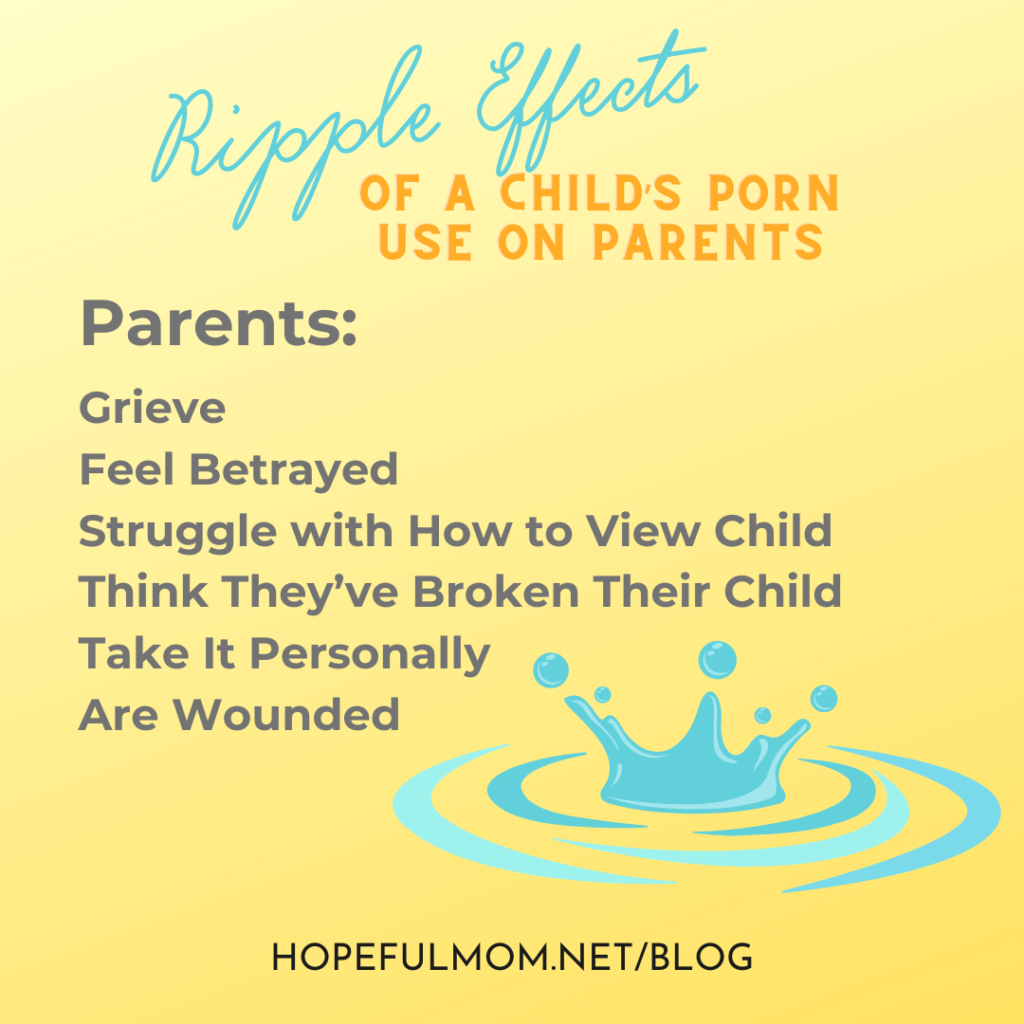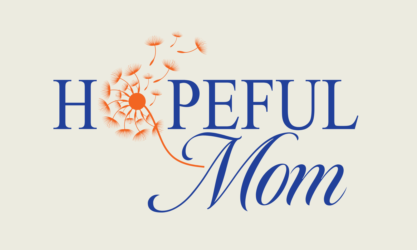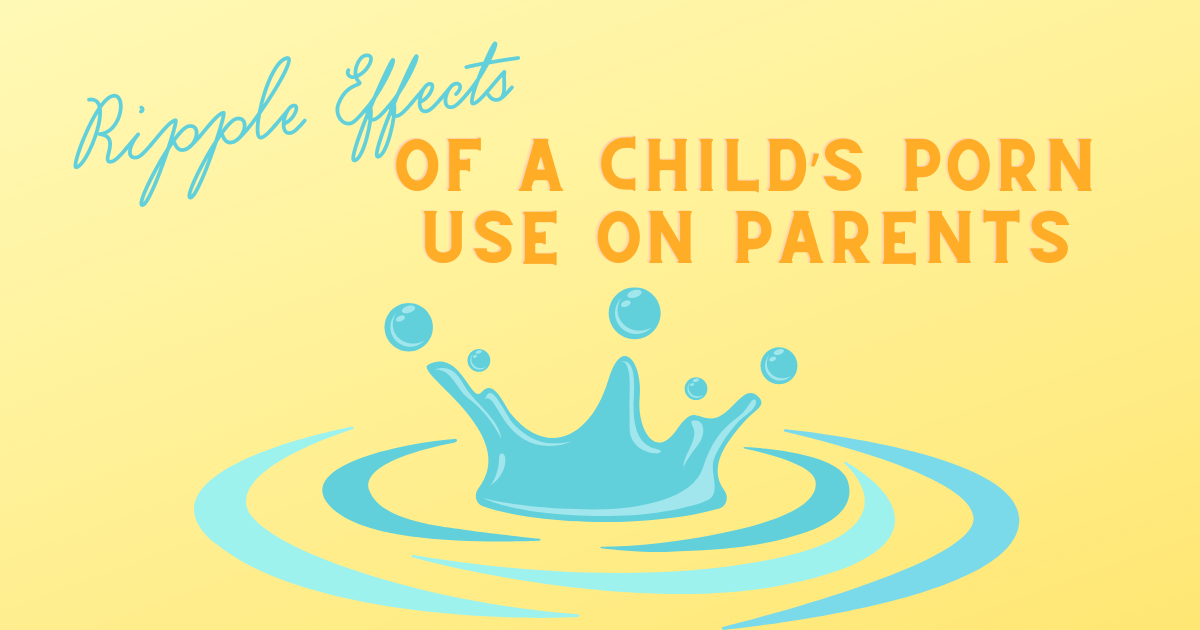“When my son’s indiscretions surfaced, I felt like I’d been punched in the gut and then kicked while down. I was unknowingly in a war zone, and when the bomb exploded, I was hit. The fallout of his conduct landed on me.”[i]
If you’re a parent, grandparent, or sibling of a child who watches (or watched) pornography, you’re likely hurt, sad, and/or mad. You may experience shame and guilt as well. That’s understandable.
Ripple effects of youth who watch pornography extend to those close by.
The following are potential ripple effects parents experience when a child watches pornography.
Parents Grieve
Grief follows any type of loss, not just a physical death. The day I learned my son watched porn, the son I knew vanished. Within a matter of minutes, he became someone different. And I grieved the loss of the son I thought I knew, the loss of his innocence, and the loss of the young man he could have become.
I couldn’t have labeled my roller-coaster emotions at the time, but that’s what happened.
I entered the shock and denial stages of grief immediately. As time passed, I bounced around and through the other stages. Eventually—after quite some time—I landed on acceptance.
Parents Feel Betrayed
Betrayal trauma, one of the ripple effects, is the damage caused by a betrayal, affecting the trust, safety, and security within the relationship.
In her book Intimate Deception: Healing the Wounds of Sexual Betrayal, Dr. Keffer states, “Trauma is a reaction of our bodies, minds, and emotions to a deeply distressing event. The earth-shattering incident changes the way we see people in our world and unravels our sense of safety. We can’t go back. We can’t erase what happened to us. Who we are and how we live significantly shift. Like a death, earthquake, or car crash, the event happens suddenly and changes us without warning, causing us to feel shock, denial, agony, terror, or helplessness.”
These reactions are typically short-lived but can be ongoing if the deception, betrayal, is ongoing.[ii]
Parents who learn they’ve been deceived for an extended period lose their sense of trust and experience triggers due to betrayal trauma.
Parents Struggle with How to View Their Child
I grew up in a culture that said people who snuck into the back end of the video store were creeps, the riffraff of society. Monsters. So, when I found out my son was one of those people who watched X-rated content, I couldn’t figure out how to picture him.
My kid was funny, creative, and personable. He loved life, talked incessantly, and had long conversations with us about theology, math, and the letter of the law. He was the only one of our four children who hadn’t lied to me. Except he had.
I couldn’t mesh these two schools of thought: My son’s amazing. My son’s a monster.How could that be? I struggled. My perspective disrupted my ability to interact with him.
That’s not a great way to parent a child.
Thankfully, as I researched the damaging effects on pornography and learned about brain science, the picture of my son changed. He wasn’t a monster; he was a victim of a billion-dollar industry that preys on children and a society that allowed it to happen.
Later, my perspective changed further. My son wasn’t a monster, and he wasn’t just a victim. He was a potential victor. That was life-giving.
Our children are human beings living in a fallen world, and they will sin. But that doesn’t mean they are bad people—or monsters.
Parents Think They’ve Broken Their Child
I thought I broke my child. If only I’d known how easily accessible pornography was. If only I’d purchased those filters we’d talked about. If only I’d nurtured my son differently.
Yes, I had failed in some areas. For those infractions, I sought God’s forgiveness and my son’s forgiveness.
On the other hand, the weight on my shoulders, the never-ending self-talk of failing and having broken my child never to be whole again—that self-talk was false guilt brought on by an enemy who likes to see us wallowing in self-pity and self-abasement.
What is your If only …?
If we get stuck here, constantly berating ourselves, neither we nor our child will heal.
As parents, we can accept responsibility for the part we played but choose not to allow false guilt to weigh us down.
When a child watches pornography, the ripple effects extend to parents. What are they and what can we do? Ripple Effects of a Child’s Porn Use on Parents #fightthenewdrug #pornharms Share on XParents Take Their Child’s Decision Personally
“We’re apt to assume our children think about the ramifications of their actions and how those consequences affect those around them. If they’ve disregarded our advice, we believe they’ve purposefully rebelled against us. In our minds, we see our children rationally thinking through all their choices and picking the one that angers us the most because they don’t believe us and are out to get us.”[iii]
Yet, typically, their decisions have nothing to do with us. It’s not personal.
Curiosity or a need (real or perceived) motivates them. Then, once they’re trapped in the behavior, their cravings take over.
Recognizing their choices aren’t a personal attack frees us to forgive and parent from love, not fear or anger.

Parents Are Wounded
This is the bottom line. Our children aren’t the only ones hurting. We are wounded, too. We have an oozing gash affecting our life.
Thankfully, wounds heal.
Are you wounded? What ripple effects are you experiencing? Are there areas that need healing? I encourage you to evaluate your situation and tend to any hurts that still exist because of your child’s behavior.
*The above is compiled from a breakout session I taught recently at the Sexual Integrity Leadership Summit in Colorado Springs, CO. My greatest joy during the conference was having my daughter there as a friend and colleague. She let me borrow her computer. Love the stickers!

[i] Quote from Sexpectations: Helping the Next Generation Navigate Healthy Generations, p. 162
[ii] Keffer, Intimate Deception, p. 45.
[iii] Quote from Sexpectations: Helping the Next Generation Navigate Healthy Generations, p. 163-164.
About the author
Barb Winters is the author of Sexpectations: Helping the Next Generation Navigate Healthy Relationships and founder of Hopeful Mom. She’s a certified mental health coach and offers one-on-one consultations for parents. For more about Barb, click "About" in the menu.



